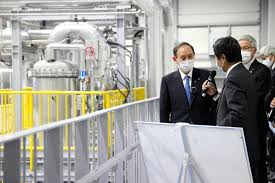A change to Japan’s plans to utilize more hydrogen as fuel as part of the country’s drive to cut carbon emissions was approved by the government on Tuesday.
The plan’s ambitious goal is to boost the annual supply from its current level to 12 million tons by 2040, a six-fold increase. Additionally, it commits 15 trillion yen ($107 billion) in funding from both public and private sources to develop supply chains for hydrogen during the subsequent 15 years.
In order to bridge the shift to renewable energy, Japan’s decarbonization policy focuses on employing so-called clean coal, hydrogen, and nuclear energy. However, other developed Western nations are pushing for quicker adoption of renewable energy sources like solar, wind, and geothermal, despite the fact that Russia’s assault on Ukraine has heightened concerns about energy security and hampered that endeavor.
Japan currently relies primarily on hydrogen produced by fossil fuels.
According to some analysts, tactics like commercializing the use of ammonia and hydrogen primarily serve the needs of powerful companies and big economic interests that are deeply engaged in fossil fuel-based technologies and have influence over governmental policy.
Nine vital sectors are given priority in the updated strategy, including the creation of water electrolysis machinery, fuel storage batteries, and massive hydrogen transport tankers.
At the Cabinet meeting on Tuesday, Chief Cabinet Secretary Hirokazu Matsuno remarked, “Hydrogen is an industrial sector that can make a triple achievement of decarbonization, stable energy supply, and economic growth in one shot.” “We will heavily promote the supply and demand for (hydrogen).”
Japan’s top officials claim they want to create a “hydrogen society,” yet the sector is still in its infancy. In order to assist the development of the necessary infrastructure and supply networks for the commercial use of pure hydrogen and ammonia, another source of hydrogen, the government is still writing regulations.
Prime Minister Fumio Kishida stated that Japan intends to build an “Asian zero-emission community,” providing Japanese technology in hydrogen, ammonia, and other decarbonization technologies, at a hydrogen council meeting with industrial executives last week.
By establishing an ambitious objective, Kishida explained, “We hope to increase the predictability of our plans and encourage long-term investment in creating a large-scale hydrogen supply and demand.”
The Cabinet also adopted an annual energy report that predicted that shortages may last until 2025 and noted that economic sanctions on Russia over its conflict with Ukraine had boosted long-term competition for liquefied natural gas. LNG prices have increased due to European demand for LNG as a substitute for Russian natural gas, necessitating the development of a long-term plan for securing a reliable energy supply.
In February, Japan enacted a “green transformation” strategy that calls for the promotion of offshore wind energy, next-generation solar batteries, and increased nuclear energy use.
According to some experts, significant business interests and major businesses that are highly involved in fossil fuel-based technology and have influence over the government are the main beneficiaries of initiatives like commercializing the use of hydrogen and ammonia.


















